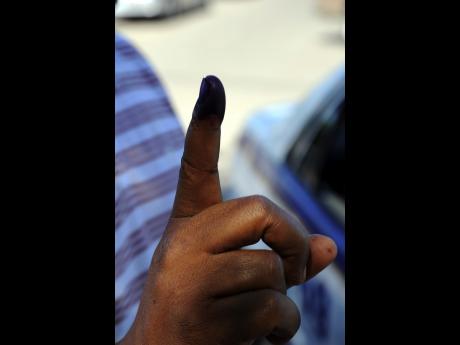Dumb 'democracy' -- Political system hurting Jamaica
"We need to rethink our version of the democratic processes to address the disenfranchisement of our people."
The greatest show of Jamaica's democracy in action is the constitutionally protected right to vote.
However, voter turnout for Jamaican elections has trended downward since 1989, with the 2011 general election recording the lowest voter turnout since 1944's Universal Adult Suffrage gave all Jamaicans the right to vote.
Since achieving independence, our electoral process has systemically lessened the power of the people. The concept of the 'safe seats', the continued power of garrison politics and, yes, the diminishing interest of Jamaicans in the political affairs of their country are symptomatic of this reality.
Approximately 28 per cent of the votes of eligible electorate was enough to give a two-thirds majority in the House of Representatives to the People's National Party (PNP) in the last election.
VOTER APATHY
We continue to hear criticisms of voter apathy and lack of civic pride, largely directed at our growing youth population. However, this withdrawal from the electoral process by young Jamaicans is nothing more than a widespread, silent and desperate cry for help.
It is imperative that Jamaica undertakes a process of extensive constitutional reform to restore the balance of power.
The Gleaner's Youth Council has agreed on a three-point list of reforms to break up the consolidated power in our current political system:
n Proportional representation through a
multiparty system
The cumbersome two-party system in Jamaica has caused our political representatives and members of the electorate to be fractioned into large opposing blocs.
These political tribes, with their rituals and traditions, leave little room for new initiates to make their mark. The simplicity of a binary, and 'either/or' situation, seems to offer us comfort and certainty. However, we should question why Jamaicans do not vote for independent candidates and new political parties. Either Jamaicans do not take new parties seriously or we prefer to stick with the
status quo, despite the fact that both options are two sides of the same coin.
DIVERSITY OF OPINION
Many Jamaicans do not like the either/or options and are turned off from the political process.
But everyone, from the taxi man to the higgler, believe they have the ideas to move the country forward. So how can such a diversity of opinion only filter into the false dichotomy of People's National Party versus. Jamaica Labour Party? The answer is that it cannot and does not.
A proportionally representative multiparty solution would force politicians to organise around issues and lobby Jamaicans to support them. The politicians whose ideas resonate will get votes and a proportionally representative group of individuals, not just two parties, will be elected to represent the nation.
However, we only have to look at how ministers are assigned portfolios to know that expertise and specialisation is not usually the first priority of the leader of the winning party.
The competition for political office will strengthen the power of the people and promote the inclusion of marginalised groups, including women and the youth.
The result of this is a more productive channelling of civic discontent and reduction in the apathetic views of the populace, particularly the youth, towards matters of governance.
NEW SYSTEM
Our first step towards this more representative system must be to do away with the archaic winner-takes-all (first-past-the-post) method in favour of a proportional representation electoral system.
n Term limits for elected officials
The cries of the people, especially outside of the excitement of election fever, is that nothing new comes from electing the same candidates.
The solution to this is so simple. Impose term limits on the prime minister and members of parliament in order to put healthy pressure on them to produce results, leaving a record of success over their tenure.
This would also regularise the transition of party leadership to a specific time frame, which will reduce in-party tension. Finally, it encourages the rise of young leaders with fresh ideas, appropriately handing over the reins to the inheritors of the nation.
n Fix the election date
Can the country continue to afford price tags as huge as $250 million to prepare for elections that don't even take place?
As political parties continue their struggles to ready their internal machinery, the taxpaying electorate is left with the bill. A set election date would effectively solve this problem. In order to avoid lengthy and/or violent campaign periods and reckless campaign spending, we must also outline a specific campaigning period.
Our democracy would be strengthened wherein no prime minister would have the power to stall elections for their political benefit or use election dates as political weapons. A necessary condition for this to work would be established exit clauses that allow for immediate dismissal and enquiries into failed administrations.
This three-point list of reforms would strengthen Jamaica's democracy and reduce apathy among the citizens, especially the youth population.
By returning the issues facing Jamaicans to the centre of political discourse, we establish a balance of power, preventing the consolidation of might that has bulldozed our rights.
Join this week's #YDemocracy conversation with YKlick. Join the #KlickItUp initiative with Y-Klick on social media!
This week's Council members are Aleya Jobson, Elton Johnson, Orville Levy, Dervin Osbourne, Tina Renier, Kemario Davis, Andre Stephens, Odeka Haughton and Robyn Boyd.




